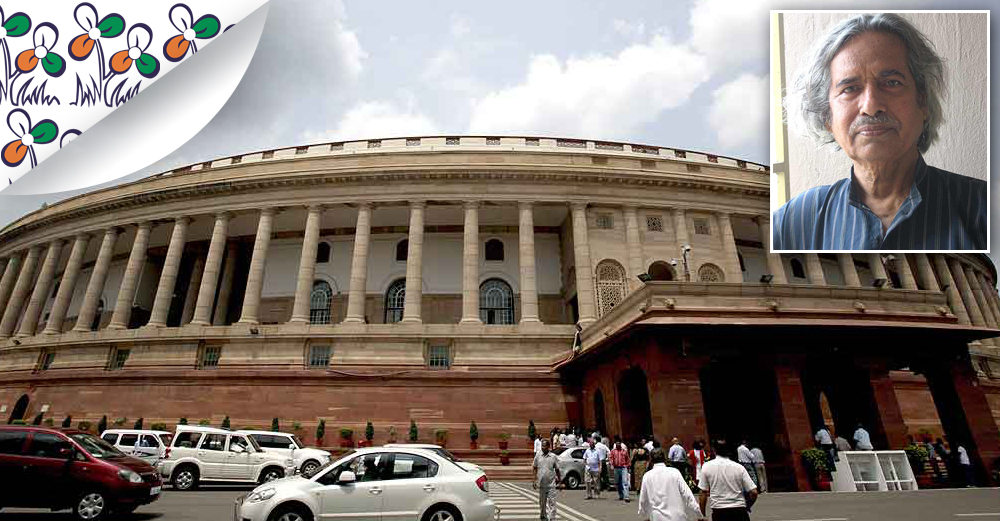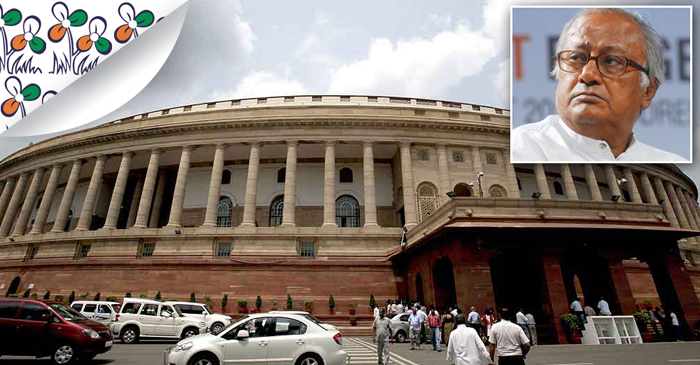Full Transcript
Mr Deputy Speaker Sir,
I rise to support, on my own behalf and on the behalf of the All India Trinamool Congress, the 119th Constitution Amendment Bill, which after an amendment is passed will become our 100th Constitution Amendment.
At the outset I would like to congratulate our Hon’ble External Affairs Minister for bringing this historical legislation before this House, and also making a statesman like speech in the opening of this discussion and debate.
Our External Affairs Minister referred to the Radcliff Award of 1947. The roots of the problem that we are going to solve in this Parliament later today go back to the tragic partition of 1947. The irony of that partition was captured best by the poet WH Auden in his poem Partition where he wrote about Radcliff. This is what he had written-
Unbiased at least he was when he arrived on his mission having never set his eyes on this land he was called to partition,
Time they had briefed him in London was short,
It’s too late for mutual consideration or rational debate.
The only solution now lies in separation.
He got down to work, on the task of settling the fate of millions,
The maps at his disposal were out of date and the census returns almost certainly incorrect.
But there was no time to check them,
No time to inspect the contested areas.
The weather was frightfully hot and dysentery constantly kept him on the trot,
But in seven weeks it was done,
The frontiers were decided, a continent,
For better or worse was divided.
The next day he sailed for England,
Where he quickly forgot the case as a good lawyer must.
Return he would not afraid as he told the club that he might get shot.
Radcliff was not a good surgeon; partition was often referred to as a surgical operation. Not only did it bring misery to the people on either side of the lines that were drawn on 1947, but like a bad surgeon, he left swabs inside the patient. These were the enclaves that are going to be exchanged now, today, the Chitmahals as we call in local parlance in West Bengal.
As I speak today, my mind goes back to 1971, a date to conjure with in South Asian history. I was merely a high school student, not even in college. I used to go with my pediatrician father, Dr Sisir Kumar Bose to the Bongaon border where millions of refuges had come from what was then, the eastern wing of Pakistan. I had seen poverty in Kolkata but I had never seen the kind of human misery I witnessed in 1971 in the refugee camps around the Bongaon town. But there was something else, I also used to visit the Netaji Field Hospital in a village called Bakchara where the brave soldiers of the Bangladesh’s Mukti Bahini used to be brought across the border and public spirited doctors surgeons from Kolkata would operate upon them, that is the only time in my Life that I have seen operations being conducted in the open. There was also not any saline, I have seen ‘daber Jol’ or coconut water being used in place of saline and these Mukti Jodhas sacrificed their all.
Our Indian soldiers made huge sacrifices. What we have witnessed in 1971 was a glorious freedom struggles against one of the most brutal military crackdowns in modern history. After the victory of December 16, 1971, Bangabandhu Sheikh Mujibur Rahaman came back and I remember that on January 17, 1972, my father met him in Dhaka.
What was the border like? He just drove across in an ambulance carrying medical supplies for newly independent Bangladesh. That was the kind of border we saw in 1971. People wanted to help each other to lead a life of dignity.
Then of course in 1974, as our External Affairs Minister has referred to, the historic agreement was made between Bangabandhu Sk Mujibur Rahaman and our great prime minister Indira Gandhi. And it is a pity that 41 years have passed before this parliament could ratify that agreement.
Today the historic words of Bangabandhu’s 7 March address are ringing in my ears. He said, “Prottek ghore ghore durgo gore tolo, rokto jokhon diyechi, rokto aro debo, ei desher manushere mukto koriya chariyabo inshallah”, and he brought freedom to the people of Bangladesh. He offered to give more sacrifice in blood so that the people of East Bengal could be free.
I had the privilege of meeting Prime Minister Sheik Hasina when they were giving an award to my father posthumously just two years ago. What is really positive, what is really historic about this Bill is the fact that in this Bill carefully balanced, and we are protecting and promoting, the national interest, the states’ interest and the human interest.
The national interest because this Bill, once it is passed later today by this House, will bring about a revolutionary transformation in the relations between India and Bangladesh and I agree with the External Affairs Minister that we will be able to rekindle the spirit of 1971 and after that when you go on to ask the people of Bangladesh and the Government of Bangladesh for trade and transit facilities, they will respond to you in a positive manner. So, national interest is supreme.
I know that earlier this week there was a little temptation to falling prey to narrow party, partisan interests. But what is important today is that the people of Assam also rose to the occasion and the temptation was resisted. National interest was put above party, political interest.
Secondly, the states’ interest was protected. It was a real privilege for me to work in the Standing Committee of external affairs. In the unanimous report that we tabled in this House on the December 1, 2014, we protected the states’ interest. This is what we said about the earlier history, “closer consultations at the highest political level between the Central Government and State Government would have been desirable. The committee while appreciating the efforts to keep the state governments on board, would suggest the Government to effectively coordinate with them in all matters and resolve the lacuna if any related to the actual implementation of the accord on the ground.”
And I am very glad, am truly happy. I have to tell the External Affairs Minister that she has conducted consultations at the highest political level as we had wanted and she has spoken several times to our leader, the Chief Minister of West Bengal Mamata Banerjee. We had also said the committee that the Central Government and the State Government of West Bengal will arrive at a consensus on the issue related to the rehabilitation package.
All the humanitarian issues should be resolved in advance including assistance from the Central Government in this regard. And I trust as External Affairs Minister assured on the floor of this House that the rehabilitation package which has been sent to her by the Government of West Bengal, led by the Chief Minister Mamata Banerjee on the December 6, 2014, will be available to the State so that we can build infrastructure and also give a true life of dignity to those in the enclaves who have been leading a miserable existence for the last 67 years. That is the most important aspect of this Bill. We are protecting the human interest.
What we are going to do today is going to be a solution of intractable problem. A solution that is going to be found in the spirit of insaniat. Under the sign of insaniat human beings are taking precedence over territory, small amounts, small pieces of territory that are only going to be notionally exchanged between the two suffering states of India and Bangladesh.
Mr Deputy Speaker Sir, I would like to say that sometimes I hear certain justifications for this agreement and I can understand that the ruling party, in order to satisfy their recalcitrant constituents in a certain province, may often have to make those kinds of arguments. I often hear that this particular piece of legislation and the final settlement of the land boundary between India and Bangladesh will help us resolve the problem of illegal emigration of smuggling across the borders and so on. Now that may well be a by-product of settlement that we are going to reach with Bangladesh. But let us remember that this historic piece of legislation is actually meant for the benefit of the law abiding citizens of India and Bangladesh.
Once the entire boundary is demarcated, I would like to see that innocent law abiding citizens of India and Bangladesh should be able to cross the border with dignity and I would urge our External Affairs Minister to have consultations with the Home Minister so that a whole series of integrated check posts can be set up along the India-Bangladesh border.
We want ordinary people to be able to cross without difficulty. We want music to flow across the border that separates to Bengals. We want theater groups from the two Bengals to come to each other and to have their performances. I have spent a lot of time as a student in Bangladesh going about all the districts, work in district record rooms and I have seen that how much people of Bangladesh admire Deshbandhu Chittaranjan Das, Sarat Chandra Bose and Netaji subhash Chandra Bose. I have seen the best performance of DL Roy’s Shah Jahan play on a stage in Dhaka. Not on this side in Calcutta even though we have great theater personalities and theater groups in West Bengal, and some of them are now actually belong to our party the All India Trinamool Congress.
So, I would like to say that let us gift this historic piece of legislation to the people of two Bengals and also to someone whose birth anniversary pochishe-e-boishakh we are going to celebrate all over the country in two days time. He wrote the national anthem of our two countries India and Bangladesh. All the songs that he wrote during the Swadeshi movement of 1905 were inspirational for the muktijoddhas of Bangladesh in 1971.
‘Bangladesher hriday hote kokhon aponi, tumi ki oporup rupe bahir hole janani, ogo maa tomay dekhe dekhe ankhi na phire’.
We have always envisioned our State Bengal and also Bharatbarsha as the mother.
In those days we used to recite Jibanananda Das’s poetry – “Banglar much ami dekhiyachi tai prithibir rup khujite jahi na aar”. That means we have seen Bengal’s face that is why we don’t need go out and find beauty in the rest of the world.
So that is what I am being reminded of here today and finally I would simply like to say that let us remember that during the hay day of the Swadeshi movement Rabindranath Tagore wrote a very beautiful song- “Amra milechi aaj mayer daake” – that means we have actually gathered here at the call of the mother. We are answering the call of the mother in passing this historic legislation in the Lok Sabha today.
It is such a great moment to see that we have risen above all political party differences. We have protected the national interest, the states’ interest and the human interest today.
So let us, as has happened in the Rajya Sabha, rise to the full stature of this House and unanimously pass the Constitution Amendment Bill and let the message go out to the whole of South Asia that we want peace of development for the poor who live all across this great subcontinent.
Thank you Deputy Speaker Sir.






